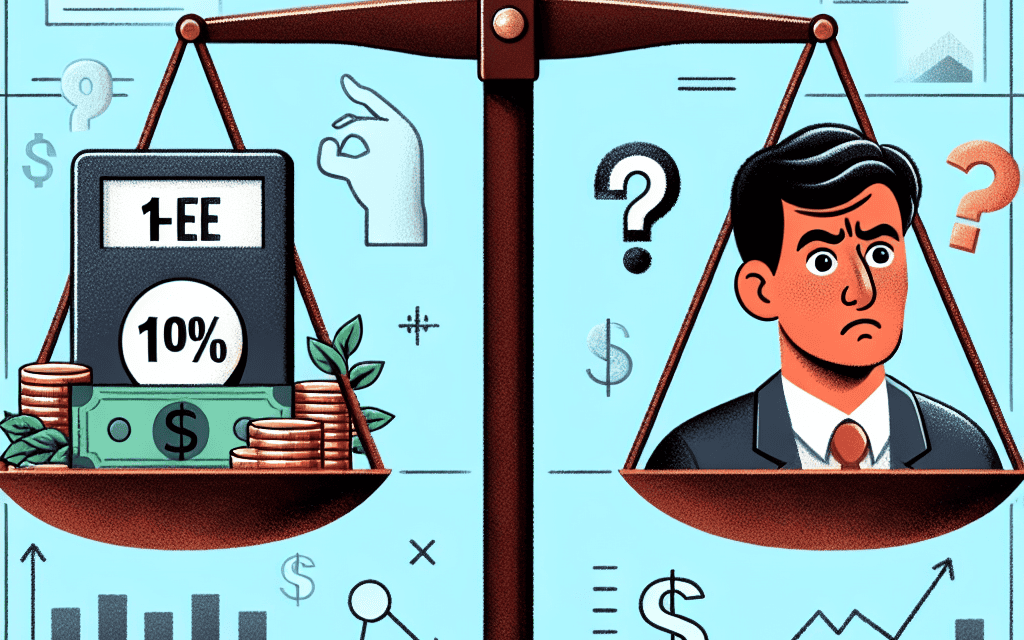“Maximize Your Wealth: Weighing Expertise Against Cost for the Savvy Investor.”
Introduction
When considering whether to enlist the services of a financial advisor, particularly at the standard fee of 1% of assets under management, individuals who are already investment savvy may question the value such an advisor can add. While self-directed investors often possess a strong understanding of market dynamics, investment strategies, and portfolio management, the decision to hire a financial advisor involves evaluating the potential benefits beyond mere investment selection. These benefits can include comprehensive financial planning, tax optimization, behavioral coaching, and estate planning, among others. Therefore, the core of this decision lies in assessing whether the additional services and peace of mind provided by a financial advisor justify the cost, even for those who are confident in their investment acumen.
Evaluating the Value of Financial Advisors for Savvy Investors
When considering the value of a financial advisor, particularly for those who already possess a degree of investment savvy, the question often arises: is the typical 1% fee truly justified? For many investors, the decision to engage a financial advisor hinges on a careful evaluation of the benefits they provide beyond mere investment selection. While it is true that knowledgeable investors may already have a firm grasp on market trends, asset allocation, and risk management, financial advisors offer a suite of services that can enhance an investor’s overall financial strategy.
To begin with, financial advisors bring a level of expertise and experience that can be invaluable, especially in navigating complex financial landscapes. They are equipped to provide comprehensive financial planning, which encompasses not only investment management but also retirement planning, tax optimization, estate planning, and risk assessment. For investors who are adept at managing their portfolios, these additional services can offer significant value by ensuring that all aspects of their financial life are aligned with their long-term goals.
Moreover, financial advisors can serve as a crucial source of discipline and accountability. Even the most seasoned investors can fall prey to emotional decision-making, particularly during periods of market volatility. An advisor can provide an objective perspective, helping investors stay the course and avoid impulsive decisions that could derail their financial plans. This guidance can be particularly beneficial in maintaining a long-term investment strategy, which is often key to achieving financial success.
In addition to providing strategic guidance, financial advisors can also save investors time and effort. Managing a comprehensive financial plan requires ongoing attention and adjustment, which can be time-consuming for individuals who are already managing busy personal and professional lives. By delegating these responsibilities to a trusted advisor, investors can focus on other priorities while still ensuring that their financial affairs are in capable hands.
Furthermore, the value of a financial advisor can be seen in their ability to offer personalized advice tailored to an investor’s unique circumstances. While general investment knowledge is valuable, each investor’s situation is distinct, with specific goals, risk tolerances, and financial constraints. Advisors can craft customized strategies that take these factors into account, potentially leading to more effective outcomes than a one-size-fits-all approach.
It is also important to consider the potential for financial advisors to enhance investment returns. While the 1% fee may seem significant, advisors often have access to a broader range of investment opportunities and possess the expertise to optimize portfolio performance. By leveraging their knowledge and resources, advisors can potentially generate returns that exceed the cost of their services, thereby justifying the fee.
In conclusion, while savvy investors may initially question the necessity of a financial advisor, a closer examination reveals that the value they provide extends far beyond basic investment advice. Through comprehensive financial planning, objective guidance, time savings, personalized strategies, and potential return enhancement, financial advisors can play a pivotal role in helping investors achieve their financial objectives. Ultimately, the decision to engage an advisor should be based on a thorough assessment of one’s individual needs and the potential benefits that professional financial guidance can offer.
Understanding the 1% Fee: Is It Justified for Experienced Investors?
When considering the services of a financial advisor, one of the most debated aspects is the typical 1% fee charged on assets under management. For those who are already investment savvy, this fee might seem like an unnecessary expense. However, understanding the value that a financial advisor can provide is crucial in determining whether this cost is justified.
To begin with, financial advisors offer more than just investment advice. They provide comprehensive financial planning, which includes retirement planning, tax strategies, estate planning, and risk management. For experienced investors, these additional services can be invaluable. While you may be adept at selecting stocks or managing a portfolio, the broader aspects of financial planning require a different set of skills and knowledge. Advisors can help ensure that your financial plan is cohesive and aligned with your long-term goals, which might not be as straightforward as managing individual investments.
Moreover, financial advisors can offer an objective perspective that is often difficult to maintain when managing your own investments. Emotional biases can cloud judgment, leading to suboptimal investment decisions. An advisor can provide a level-headed approach, helping to navigate market volatility and avoid impulsive decisions that could negatively impact your portfolio. This objectivity can be particularly beneficial during periods of market turbulence, where the temptation to react hastily can be strong.
In addition to providing emotional discipline, financial advisors have access to a wealth of resources and tools that individual investors might not. They can offer insights into market trends, access to exclusive investment opportunities, and sophisticated analytical tools that can enhance portfolio performance. For those who are already knowledgeable about investing, these resources can complement their existing expertise and potentially lead to better investment outcomes.
Furthermore, the time commitment required to manage a comprehensive financial plan should not be underestimated. Even for those who are investment savvy, the demands of staying informed about market developments, rebalancing portfolios, and adjusting strategies in response to life changes can be significant. A financial advisor can alleviate this burden, allowing you to focus on other priorities while ensuring that your financial plan remains on track.
However, it is important to weigh these benefits against the cost of the 1% fee. For some, particularly those with smaller portfolios, this fee can represent a substantial portion of their investment returns. In such cases, the value provided by an advisor must be carefully evaluated to ensure it justifies the expense. Additionally, it is essential to consider the advisor’s qualifications, experience, and track record to ensure that they are capable of delivering the promised value.
In conclusion, while the 1% fee for a financial advisor might seem steep for those who are already investment savvy, the comprehensive services, objective perspective, and access to resources they provide can offer significant value. Ultimately, the decision to engage a financial advisor should be based on a careful assessment of your individual needs, goals, and the potential benefits relative to the cost. By doing so, you can determine whether the fee is a worthwhile investment in your financial future.
Comparing DIY Investing to Professional Financial Advice
When considering the management of personal finances, particularly investments, individuals often face the decision of whether to handle their portfolios independently or to enlist the services of a professional financial advisor. This decision becomes even more nuanced for those who are already investment savvy. The question arises: is a financial advisor worth the typical 1% fee when one possesses a solid understanding of investment strategies and market dynamics?
To begin with, it is essential to acknowledge the advantages of DIY investing. For individuals who are well-versed in financial markets, managing their own investments can be both empowering and cost-effective. By avoiding the 1% fee typically charged by financial advisors, investors can potentially enhance their returns over time. Moreover, DIY investors have the flexibility to make real-time decisions, allowing them to respond swiftly to market changes. This autonomy can be particularly appealing to those who enjoy the challenge of navigating the complexities of the financial world.
However, despite these benefits, there are several compelling reasons why even the most knowledgeable investors might consider professional financial advice. One significant advantage of hiring a financial advisor is the access to a broader range of investment opportunities and insights. Financial advisors often have access to exclusive investment products and research that may not be readily available to individual investors. This access can provide a competitive edge, particularly in volatile or niche markets.
Furthermore, financial advisors offer a level of objectivity that can be difficult to maintain when managing one’s own investments. Emotional biases, such as overconfidence or fear, can cloud judgment and lead to suboptimal investment decisions. A financial advisor can provide a rational perspective, helping to mitigate these biases and ensure that investment strategies align with long-term financial goals.
In addition to investment management, financial advisors offer comprehensive financial planning services. This holistic approach encompasses not only investment strategies but also retirement planning, tax optimization, estate planning, and risk management. For individuals with complex financial situations, the expertise of a financial advisor can be invaluable in creating a cohesive and effective financial plan.
Moreover, the time commitment required for effective DIY investing should not be underestimated. Staying informed about market trends, researching investment opportunities, and regularly rebalancing a portfolio can be time-consuming tasks. For those with demanding careers or personal commitments, delegating these responsibilities to a financial advisor can free up valuable time and reduce stress.
It is also worth considering the potential for increased returns that a financial advisor might offer. While the 1% fee may seem significant, a skilled advisor can potentially enhance portfolio performance through strategic asset allocation, tax-efficient investing, and risk management. Over the long term, these benefits may outweigh the cost of the advisory fee.
In conclusion, while DIY investing offers autonomy and cost savings, the value of a financial advisor extends beyond mere investment management. For those who are already investment savvy, the decision to hire a financial advisor should be based on a careful evaluation of personal circumstances, financial goals, and the potential benefits of professional guidance. Ultimately, the choice between DIY investing and professional financial advice is a personal one, influenced by individual preferences, resources, and objectives.
The Hidden Benefits of Hiring a Financial Advisor

When considering the value of hiring a financial advisor, particularly for those who already possess a degree of investment savvy, the decision often hinges on the perceived worth of the typical 1% fee. At first glance, this fee might seem like an unnecessary expense for individuals who are confident in their ability to manage their own portfolios. However, a deeper exploration reveals several hidden benefits that can make the cost worthwhile, even for the financially astute.
To begin with, financial advisors offer a level of expertise and experience that can enhance even the most knowledgeable investor’s strategy. While you may be well-versed in market trends and investment principles, advisors bring a wealth of experience from working with diverse clients and navigating various market conditions. This breadth of experience allows them to provide insights that might not be immediately apparent to someone managing their own investments. Moreover, advisors have access to a wide range of resources and tools that can further refine investment strategies, potentially leading to better long-term outcomes.
In addition to their expertise, financial advisors provide an objective perspective that can be invaluable in decision-making. Even the most disciplined investors can fall prey to emotional biases, such as overconfidence or fear, which can lead to suboptimal investment choices. An advisor acts as a neutral third party, offering guidance that is free from the emotional influences that might cloud your judgment. This objectivity can help ensure that your investment decisions are aligned with your long-term financial goals, rather than being swayed by short-term market fluctuations.
Furthermore, financial advisors offer comprehensive financial planning services that extend beyond mere investment management. They can assist with retirement planning, tax optimization, estate planning, and risk management, among other areas. This holistic approach ensures that all aspects of your financial life are working in harmony, which can be particularly beneficial for those with complex financial situations. By integrating these various elements, advisors can help you create a cohesive financial plan that maximizes your wealth and secures your financial future.
Another significant advantage of hiring a financial advisor is the time and stress savings they provide. Managing a portfolio requires continuous monitoring and adjustment, which can be time-consuming and stressful, especially during volatile market periods. By delegating these responsibilities to a professional, you can free up time to focus on other important aspects of your life, such as your career or family. This peace of mind is often an overlooked benefit that can greatly enhance your overall quality of life.
Moreover, financial advisors can serve as educators, helping you deepen your understanding of financial concepts and strategies. This educational component can empower you to make more informed decisions and become a more confident investor over time. By working collaboratively with an advisor, you can expand your knowledge and skills, which can be particularly valuable if you wish to take a more active role in managing your finances in the future.
In conclusion, while the 1% fee for hiring a financial advisor may initially seem like an unnecessary expense for those who are already investment savvy, the hidden benefits they offer can justify the cost. From providing expert insights and objective guidance to offering comprehensive financial planning and stress relief, advisors can play a crucial role in enhancing your financial well-being. Therefore, even the most knowledgeable investors may find that the value of a financial advisor extends far beyond the fee, ultimately contributing to a more secure and prosperous financial future.
Cost-Benefit Analysis: Financial Advisors vs. Self-Management
When considering whether to enlist the services of a financial advisor, particularly when faced with the typical 1% fee, many investment-savvy individuals find themselves at a crossroads. The decision to manage one’s own investments or to seek professional guidance is not merely a question of cost but also of value. To make an informed choice, it is essential to weigh the benefits a financial advisor can offer against the potential savings of self-management.
Firstly, it is important to recognize that financial advisors bring a wealth of expertise and experience to the table. While an individual may possess a solid understanding of investment principles, advisors often have access to a broader range of financial products and strategies. They are trained to navigate complex financial landscapes and can provide insights that might not be immediately apparent to the average investor. Moreover, advisors are adept at tailoring investment strategies to align with specific financial goals, risk tolerances, and life circumstances, which can be particularly beneficial during times of market volatility or personal financial change.
In addition to their expertise, financial advisors offer a level of objectivity that can be difficult to maintain when managing one’s own investments. Emotional decision-making is a common pitfall for individual investors, often leading to impulsive actions that can undermine long-term financial goals. Advisors, on the other hand, can provide a steady hand, helping to keep emotions in check and ensuring that investment decisions are made based on sound analysis rather than reactionary impulses. This objectivity can be invaluable, particularly during periods of market turbulence when the temptation to deviate from a well-considered investment plan is at its peak.
Furthermore, financial advisors can save investors significant time and effort. Managing a diversified investment portfolio requires ongoing research, monitoring, and rebalancing, tasks that can be both time-consuming and complex. For those with demanding careers or personal commitments, the convenience of delegating these responsibilities to a professional can be a compelling reason to justify the 1% fee. This delegation allows individuals to focus on other priorities while still ensuring that their financial future is being actively managed.
However, it is also crucial to consider the potential drawbacks of hiring a financial advisor. The 1% fee, while seemingly modest, can compound over time, potentially eroding investment returns. For those with substantial portfolios, this fee can represent a significant cost. Additionally, not all advisors are created equal; the quality of advice can vary widely, and there is always the risk of encountering conflicts of interest, particularly if an advisor is incentivized to recommend certain products.
Ultimately, the decision to hire a financial advisor should be based on a careful assessment of one’s own financial knowledge, the complexity of their financial situation, and their willingness to dedicate time to managing their investments. For some, the peace of mind and professional guidance provided by an advisor may be well worth the cost. For others, particularly those with a strong grasp of investment principles and the time to manage their portfolios, self-management may be the more cost-effective route. In either case, the key is to ensure that the chosen approach aligns with one’s financial goals and personal circumstances, thereby maximizing the potential for long-term financial success.
How Financial Advisors Can Enhance an Already Strong Portfolio
When considering whether a financial advisor is worth the typical 1% fee, even for those who are already investment savvy, it is essential to evaluate the multifaceted value that such professionals can bring to an already strong portfolio. While self-directed investors may possess a robust understanding of market dynamics and investment strategies, financial advisors offer a breadth of services that extend beyond mere portfolio management. These services can enhance financial outcomes through comprehensive planning, emotional discipline, and access to specialized knowledge.
To begin with, financial advisors provide holistic financial planning that encompasses more than just investment decisions. They consider a client’s entire financial picture, including tax strategies, estate planning, retirement goals, and risk management. This comprehensive approach ensures that all aspects of a client’s financial life are aligned and optimized for long-term success. For instance, an advisor might identify tax-efficient strategies that a self-directed investor may overlook, thereby enhancing after-tax returns. Moreover, they can assist in estate planning, ensuring that wealth is transferred according to the client’s wishes while minimizing tax liabilities.
In addition to comprehensive planning, financial advisors offer an objective perspective that can be invaluable during periods of market volatility. Even the most seasoned investors can fall prey to emotional decision-making, which can lead to suboptimal investment choices. Advisors act as a buffer against such tendencies, providing rational, evidence-based guidance that helps clients stay the course during turbulent times. This emotional discipline can prevent costly mistakes and ensure that investment strategies remain aligned with long-term objectives.
Furthermore, financial advisors have access to a wide array of resources and specialized knowledge that can benefit even the most knowledgeable investors. They often have insights into market trends, economic forecasts, and investment opportunities that are not readily available to individual investors. This access can lead to more informed decision-making and potentially higher returns. Additionally, advisors can offer expertise in niche areas such as socially responsible investing or alternative investments, which may not be within the purview of a self-directed investor.
Moreover, the value of a financial advisor is not solely measured by immediate financial returns. They also provide peace of mind by taking on the administrative burdens of managing a portfolio. This allows clients to focus on other aspects of their lives, knowing that their financial affairs are in capable hands. The time saved and stress alleviated can be significant, particularly for those with complex financial situations or demanding personal and professional commitments.
While the 1% fee may seem substantial, it is crucial to weigh this cost against the potential benefits. The enhanced financial outcomes, emotional discipline, specialized knowledge, and peace of mind that a financial advisor can provide often justify the expense. For those who are already investment savvy, the decision to engage a financial advisor should be based on a thorough assessment of these factors and how they align with personal financial goals.
In conclusion, even for those with a strong grasp of investment principles, a financial advisor can offer significant value that extends beyond mere portfolio management. By providing comprehensive planning, emotional discipline, specialized knowledge, and peace of mind, advisors can enhance an already strong portfolio and contribute to long-term financial success. Therefore, the 1% fee may indeed be a worthwhile investment for those seeking to optimize their financial future.
The Role of Financial Advisors in Advanced Investment Strategies
When considering the value of a financial advisor, particularly for those who already possess a degree of investment savvy, it is essential to evaluate the multifaceted role that these professionals can play in advanced investment strategies. While the typical fee of 1% of assets under management may seem substantial, the potential benefits offered by a financial advisor can often justify this cost, especially when viewed through the lens of comprehensive financial planning and strategic investment management.
To begin with, financial advisors bring a wealth of expertise and experience that can enhance even the most knowledgeable investor’s approach. They are equipped with the latest market insights, economic forecasts, and investment tools that can help refine and optimize an existing portfolio. For instance, an advisor can provide access to sophisticated investment vehicles and strategies that may not be readily available to individual investors. This includes alternative investments, tax-advantaged accounts, and complex financial instruments that require a deeper understanding of market dynamics.
Moreover, financial advisors offer an objective perspective that can be invaluable in making sound investment decisions. Even the most experienced investors can fall prey to emotional biases, such as overconfidence or loss aversion, which can lead to suboptimal decision-making. An advisor acts as a rational counterbalance, providing guidance that is grounded in data and analysis rather than emotion. This objectivity can be particularly beneficial during periods of market volatility, where maintaining a disciplined approach is crucial.
In addition to investment management, financial advisors play a critical role in holistic financial planning. They can assist with retirement planning, estate planning, tax optimization, and risk management, ensuring that all aspects of an individual’s financial life are aligned with their long-term goals. For instance, an advisor can help structure a retirement plan that balances growth with income needs, or devise an estate plan that minimizes tax liabilities while preserving wealth for future generations. These services extend beyond mere investment advice, offering a comprehensive approach to financial well-being.
Furthermore, the regulatory landscape surrounding investments is continually evolving, and staying abreast of these changes can be challenging for individual investors. Financial advisors are well-versed in the latest regulations and compliance requirements, ensuring that their clients’ portfolios are managed in accordance with current laws. This expertise can prevent costly mistakes and provide peace of mind, knowing that one’s investments are being handled with due diligence and care.
While the 1% fee may initially appear as a significant expense, it is important to consider the potential for enhanced returns and risk mitigation that a financial advisor can provide. By leveraging their expertise, investors may achieve better portfolio performance, which can offset the cost of the advisory fee. Additionally, the time and effort saved by delegating complex financial tasks to a professional can be invaluable, allowing investors to focus on other priorities.
In conclusion, for those who are already investment savvy, the decision to engage a financial advisor should be based on a thorough assessment of the value they can add to one’s financial strategy. By offering expert guidance, objective advice, and comprehensive planning services, financial advisors can play a pivotal role in navigating the complexities of advanced investment strategies, ultimately contributing to the achievement of long-term financial goals.
Q&A
1. **Question:** What is the typical fee structure for financial advisors?
**Answer:** Financial advisors typically charge a fee of around 1% of the assets they manage annually.
2. **Question:** What services do financial advisors provide beyond investment management?
**Answer:** Financial advisors offer services such as financial planning, tax optimization, retirement planning, estate planning, and risk management.
3. **Question:** How can a financial advisor add value to an investment-savvy individual?
**Answer:** A financial advisor can provide objective advice, help avoid emotional decision-making, offer advanced financial strategies, and ensure comprehensive financial planning.
4. **Question:** What are the potential benefits of having a financial advisor for tax planning?
**Answer:** Financial advisors can help optimize tax strategies, identify tax-efficient investments, and ensure compliance with tax laws, potentially saving money.
5. **Question:** How might a financial advisor assist with retirement planning?
**Answer:** They can help set realistic retirement goals, create a sustainable withdrawal strategy, and adjust plans based on changing circumstances or market conditions.
6. **Question:** What are the risks of managing investments without a financial advisor?
**Answer:** Risks include making emotional decisions, missing out on advanced strategies, overlooking tax implications, and lacking a comprehensive financial plan.
7. **Question:** How can an investment-savvy individual determine if a financial advisor is worth the fee?
**Answer:** They should assess the value of additional services provided, potential for improved financial outcomes, and personal comfort with managing complex financial situations independently.
Conclusion
A financial advisor can be worth the 1% fee even for investment-savvy individuals, depending on specific circumstances and needs. While knowledgeable investors may effectively manage their portfolios, advisors offer value through comprehensive financial planning, tax optimization, estate planning, and behavioral coaching. They can provide an objective perspective, help avoid emotional decision-making, and ensure alignment with long-term goals. Additionally, advisors may have access to investment opportunities and strategies not readily available to individual investors. Ultimately, the decision should weigh the potential benefits of personalized advice and peace of mind against the cost, considering one’s confidence in managing all aspects of their financial life independently.





